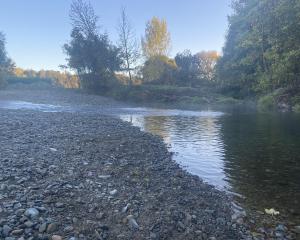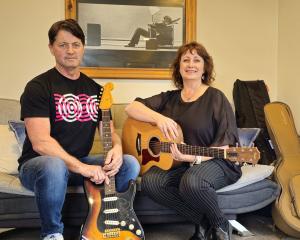Mr Norman (67), an Antarctic veteran and internationally qualified mountain guide, is preparing for his fourth year as part of the Nasa and US National Science Foundation-funded Antarctic Search for Meteorites - known as Ansmet.
Since 1976, Ansmet exploration teams have scoured areas of blue ice, searching in grids by foot and snowmobile to find the precious space rocks exposed on the surface by wind and glacial uplifting. Already more than 17,000 specimens have been found.
This week he is taking an eight-person team to the Beardmore Glacier to spend six weeks searching in temperatures averaging -17degC with 15-20 knot winds and at an altitude above 2460m.
Searcher slowly traverses sections of ice, travelling up to 75m apart. Mr Norman says it takes sharp and knowledgeable eyes to find what they are looking for.
"It's got a cooked crust on it- what they call fusion crust where it's actually come down through the atmosphere, burning on the outside. Sometimes the shape, which is shaped like a shell, is another giveaway, and quite often maybe it's broken up or got weathered in its long journey on the ice."
The volunteers on these searches are usually meteorite experts. As in some previous years, this year's team includes an astronaut.
It is Mr Norman's job to ensure the volunteers' safety, and this year he was relieved there was little crevassing in the search area so there was no possibility of people "popping down holes".
"But [there are] other things as well, like checking on people who are maybe a bit more lightly built so they've got a tendency to get cold very quickly and they keep on keeping on because they are so keen to get the work done."
Once they find the meteorites, Mr Norman said it was important to keep them in the state in which they were acquired.
"They're refrigerated in boxes, all carefully preserved and sterile-wrapped in their own bags, shipped back to the States in that condition and kept in Houston's base, still frozen.
"They have a bit of a look at them and the really interesting ones get shipped on to the Smithsonian in Washington."
Mr Norman had already been working in Antarctica for decades, firstly for the British Antarctic Survey in 1966 before starting at Scott Base as deputy leader in 1972.
He returned for the next two seasons, running a project on Mt Erebus - one of a handful of volcanoes worldwide that has a flowing lava lake in its crater - then moved on to Terra Nova Bay, and eventually joined the Americans at McMurdo base.
Born in England in 1943, Mr Norman has travelled extensively and was always interested in mountain guiding.
After working as hut wardens at Aoraki Mt Cook, he and wife Judy moved to Twizel in 1977 where they operate a "low-key" mountain guiding business called High Country Expeditions.
In addition to guiding locally, they lead tailored overseas expeditions off the beaten track to places like Mount Kilimanjaro, in Tanzania.
"I have to say they're quite successful- everybody who we've taken we've got up, which is one mark of a good plan.
"I always do an acclimatisation peak first, otherwise I won't take them up Kilimanjaro, which is 18,500 feet high. That means you're sure they're going to get up. We usually finish that off by flying out to the Serengeti, to the national game parks, which are just super."
Mr Norman shows no sign of slowing down, having only just arrived back from travels to Europe, the UK and the United States three weeks before departing for the Antarctic.
He still has an appetite for trailblazing ("Hell, yeah. You've got to go out and find these things") and for the Antarctic.
"It is unique, there's no doubt about it. There's never, ever anywhere else you see these giant areas of ice-shelf, these snowy ranges disappearing into the distance. That is very, very special.
"I've been pretty lucky to have been down this many times. Some people would say you're a complete idiot, but not me. I very much enjoy it."
- Joe Dodgshun












